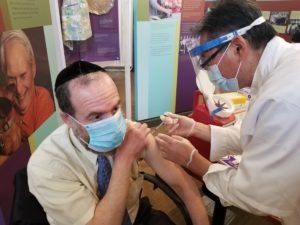
With the release of the coronavirus vaccine, there have been reports of people pursuing questionable practices in order to get it. Some are crossing state lines for access to another state’s supply, in what is known as “vaccine tourism,” while in Florida, two women under the age of 50 are accused of disguising themselves as grandmothers to get vaccinated.
With the pandemic having now disrupted an entire year, some may be feeling significant temptation to skip ahead of what officials say is their place in line for the vaccine. Rabbis and medical professionals weighed in on the ethics of this.
“Jewish law would forbid such behavior,” said Rabbi Rory Katz of Chevrei Tzedek Congregation. “It’s pretty clearly in the Ten Commandments, where it says that you should not bear false witness. And I think misrepresenting yourself fits in that category.”
At the same time, the Torah does include stories of respected figures disguising themselves for their own gain, such as Jacob, who misrepresented himself to his ailing father to receive the blessing meant for his elder brother, Katz said. While explaining the story does not necessarily condemn Jacob for his behavior, “it’s not seen as a model of how you should behave,” Katz said.
A nuanced view of the issue also came from Rabbi Avram Israel Reisner, rabbi emeritus of Chevrei Tzedek and a member of the Conservative movement’s Committee on Jewish Law and Standards.
“It is a wildly complicated business, and I want to separate between fraudulent applications and traveling to get a supply that’s available elsewhere that isn’t available where you are,” Reisner said.
Reisner considered fraud in the pursuit of the vaccine simply unacceptable. However, there are situations when getting ahead in line might be OK. He recalled hearing a case in which a younger person received the vaccine by going to a vaccination site toward the end of the day and getting in line in the hopes there would be extra vaccines available.
“That’s a form of line skipping, in a sense,” Reisner said. “But at the moment that you’re applying for the vaccine excess, the vaccination site, the state or whoever it is, wants to use up that vaccine [and] is worried about the possibility of wasting the vaccine. So you have not done anything fraudulent. What you’ve done is put yourself in a position to be the proper choice of the authorities that are giving out the vaccine. So I don’t think that has the same sort of ethical problems.”
Additionally, Reisner knows individuals who had traveled out of state in order to receive the vaccine, and he did not consider their behavior offensive, provided they received it “within a standard vaccine distribution format,” he said.
Fraudulently obtaining vaccinations, such as with the example of the two young women in Florida, is the equivalent of stealing, said Dr. Ivor Berkowitz, a clinician and affiliate faculty member of the Johns Hopkins Berman Institute of Bioethics.
A guiding principle during the creation of the vaccine guidelines, whether by the states or the Centers for Disease Control and Prevention, has been transparency, Berkowitz said. He argued this transparency has almost been corrupted by this type of behavior.
“You sort of want to believe that there’s trust in the system, that CDC has tried to promote this transparency,” Berkowitz said. “And these kind of events just sabotage that.”
Nancy Kass, a professor of bioethics and public health at the Johns Hopkins Berman Institute of Bioethics and the Johns Hopkins Bloomberg School of Public Health, distinguishes between those who employ deception and those who were technically following the rules when traveling to different states.
Kass saw the current vaccine situation as similar to the early days of kidney dialysis machines, when many people suffering from renal failure were in clear need of the new technology, launching a debate about whose health should be prioritized.
However, Kass said, vaccine tourism or using deception to get vaccinated are not the biggest ethical issues right now.
“Our much bigger problem is the people who are eligible who are not able to get the vaccine because they don’t have a private car and so they can’t get down to the convention center, or because they don’t have an internet connection and so they can’t get on to the CVS site and the Walgreens site … all at 6 on Saturday morning,” Kass said.
The vaccines are much more likely to go to people who are white, well-off and who have professional careers, despite the fact that this does not reflect who is most likely to get or die from COVID-19, Kass said.
“My view is that the biggest ethical challenges right now are not caused by some people who are cheating the system,” Kass said. “They’re caused by a system that is not yet sufficiently acceptable for people who are a little bit more disadvantaged.”
Similarly, Katz believes that the community should not be focusing on the relatively small number of people who may be behaving deceitfully regarding vaccines, she said. Rather, she expressed that attention should be devoted toward getting the vaccine to those who most need it and on the inability of vulnerable people to access it, which she viewed as a more widespread and systemic issue.
“When you have a system where there’s scarcity, of course people are going to be angry,” Katz said. “But I think that the anger should be directed not at the individuals who are skipping the line, so much as the system that started producing the vaccine slower than it could have and could be producing more and distributing it more equitably more quickly.”






